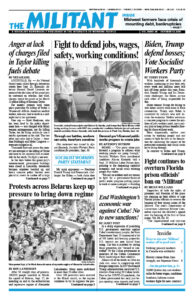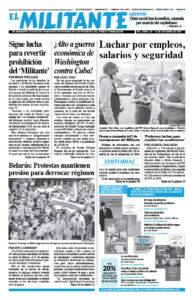LOUISVILLE, Ky. — As National Guard tanks rolled through downtown streets here Sept. 23, Kentucky Attorney General Daniel Cameron announced the decisions of the grand jury he convened on whether, and what, charges should be issued in the March 13 police killing of Breonna Taylor.
For months protests have taken place protesting the killing of Taylor, a 26-year-old African American medical worker, who was shot to death in a midnight raid in her apartment.
One cop — Brett Hankison, who has been fired by the police department here — was charged with felony wanton endangerment, not for killing Taylor, but for firing recklessly into a nearby apartment in the raid. The two other cops who shot at Taylor — Jonathan Mattingly and Myles Cosgrove — were not charged at all.
Thousands here and across the country are outraged at the killing of Taylor and want to see someone held accountable for her death. The fight is not over.
In the days before the grand jury’s announcement, government buildings were closed in Louisville, downtown business windows boarded up, and heavy concrete police barriers were placed in streets to cordon off a large part of downtown to traffic. The day before the announcement, Louisville Mayor Gregory Fischer enacted a 9 p.m. to 6:30 a.m. curfew that lasted five days. Every night every cellphone in Louisville received a loud alarm signal and an order to obey the curfew.
After Cameron’s announcement, small groups organized to break windows and vandalize shops in the Highlands neighborhood. Two police officers were shot and wounded at an action downtown. Most working people respected the curfew and stayed away, because of the record of vandalism, looting, shootings and harassment of diners and others in the city associated with protests over the past months. Black Lives Matter Louisville organizer Reece Chenault threatened, “There is going to have to be an increased level of discomfort” for people here going forward.
The grand jury decisions
The laws are written, and were promoted by the attorney general, first and foremost to protect the cops at all costs.
When the Louisville cops broke down Taylor’s door, and busted their way into her apartment, her boyfriend, Kenneth Walker, was convinced they were in danger. He picked up his gun, which he was carrying legally, and fired, hitting Mattingly. The cops responded with a hail of 32 bullets, killing Taylor.
In Kentucky, like in most states, the law stipulates that if someone fires a gun at police, no matter the circumstances, the police are justified in returning fire, no matter how lethal the results.
This is why the attorney general said no charges were filed in Taylor’s killing.
There remain many questions about the killing, about the conduct of the cops and about how the attorney general presented the findings of the grand jury. One grand jury member filed a suit Sept. 28 charging that Cameron misrepresented their deliberations and did not, as he claimed, offer them the option to indict the two cops who killed Taylor. She said she wanted the transcript of their deliberations made public and to be freed to speak about what happened. Taylor’s family also called for it to be released.
Cameron said he would grant both requests, but then announced he wanted to wait at least a week to protect witnesses’ identities.
A case watched across the country
Rightly so, Breonna Taylor has become a household name and symbol of the fight against police brutality, particularly toward African Americans, and a focus of anger against police impunity. The fight for justice around her killing has won international attention.
But, in the absence of working-class leadership from unions, churches and other mass organizations, many protests here have targeted Caucasians, restaurant owners and others, as opposed to demanding the cops be held accountable. The actions have been organized in ways that encouraged indisciplined and violent acts. Groups carrying arms have been allowed to participate, opening the door to retaliation by cops and right-wing groups.
Vandalism, looting, and attacks on police by protesters have occurred. Downtown Louisville, once a thriving center of restaurants, stores and museums, is a boarded-up, graffiti-scarred ghost town.
There was the potential here to build broad, disciplined protests to involve tens of thousands of working-class people of all races and nationalities who oppose the police killing of Taylor and others. Examples of what was possible started to happen early on, before these actions were hijacked by petty-bourgeois violence mongers and race-baiters who have contempt for working people. But the opening to mobilize the broad social pressure needed to hold the cops and city officials accountable has been badly damaged and squandered.
Middle-class radicals in and around organizations like Black Lives Matter have encouraged race-baiting, confrontations with police, and provocative armed bravado. And they have presented this as revolutionary.
This narrows the space for increasing an understanding that police brutality is an essential component of the continued rule of the capitalist class and its government.
The rulers here recognize that the cop killing of Breonna Taylor aroused the attention of tens of thousands. This is reflected in the decision of the city government to settle a civil case brought by Taylor’s family and pay them $12 million and agree to some police-related reforms.
Charges against the cops and other authorities remain possible. A federal investigation continues, including the possibility of charges based on the cops’ violation of Taylor’s constitutional rights. There are many questions about the killing that remain unanswered. The discussion of police brutality and the killing of Breonna Taylor is not over, and the need for the working class to put its stamp on whatever comes next isn’t either.

